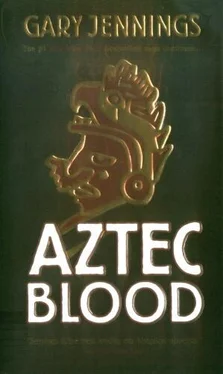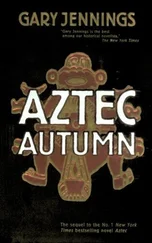Gary Jennings - Aztec Blood
Здесь есть возможность читать онлайн «Gary Jennings - Aztec Blood» весь текст электронной книги совершенно бесплатно (целиком полную версию без сокращений). В некоторых случаях можно слушать аудио, скачать через торрент в формате fb2 и присутствует краткое содержание. Жанр: Старинная литература, на английском языке. Описание произведения, (предисловие) а так же отзывы посетителей доступны на портале библиотеки ЛибКат.
- Название:Aztec Blood
- Автор:
- Жанр:
- Год:неизвестен
- ISBN:нет данных
- Рейтинг книги:4 / 5. Голосов: 1
-
Избранное:Добавить в избранное
- Отзывы:
-
Ваша оценка:
- 80
- 1
- 2
- 3
- 4
- 5
Aztec Blood: краткое содержание, описание и аннотация
Предлагаем к чтению аннотацию, описание, краткое содержание или предисловие (зависит от того, что написал сам автор книги «Aztec Blood»). Если вы не нашли необходимую информацию о книге — напишите в комментариях, мы постараемся отыскать её.
Aztec Blood — читать онлайн бесплатно полную книгу (весь текст) целиком
Ниже представлен текст книги, разбитый по страницам. Система сохранения места последней прочитанной страницы, позволяет с удобством читать онлайн бесплатно книгу «Aztec Blood», без необходимости каждый раз заново искать на чём Вы остановились. Поставьте закладку, и сможете в любой момент перейти на страницу, на которой закончили чтение.
Интервал:
Закладка:
I examined the black stone with the polished side.
"It is a shadow mirror," the fray said, "obsidian from a volcano, burnished until it blazes with a deep gloss. The indio magicians tell fools it foretells their tonal, their fate. If one breaks, they peddle the pieces to other idiots, saying they sell them the hearts of stars. You could buy mountains of them for a reale—or gather them by the wagonful on volcanic slopes. What did you offer the fraud for it?"
"Nothing," I lied.
The Healer was not at the stone slab, nor the spot where he robbed me of my dinero. I went looking where indios camped, ready to threaten him if he didn't return my money. I had never been so angry. Or embarrassed. Did this indio faker think he was a picaro? That was supposed to be my job.
Ay! I could not find the scoundrel. He was gone. With my two reales. My wounded pride would mend, but the money, the money was more sacred to me than the papal throne.
TWENTY-EIGHT
An hour before sunset, I went to watch the play.
The play was put on in a tree-enclosed clearing with blankets hung to conceal the players from illicit onlookers. The sloped terrain allowed the players to occupy the high ground.
I didn't have a silver reale, the price of admission, but I found an affordable vantage point. Climbing a nearby tree, high above the blankets, I had my own private balcony, gratis. The dwarf taking admission at the entrance naturally shot me irate glances, but I was picaro-born and ignored him. After all several priests took up positions outside the blanket wall, folded the blanket drapes over their ropes and robbed the troupe of the admission fee as ruthlessly as I. And naturally no one challenged them.
Before the play began, the two attractive picaras hustled the mostly male audience, purveying sweetmeats. Flirtation went with the vending. Spanish men outnumbered Spanish females twenty to one in New Spain; and these Spanish women, though picaras, spellbound these hombres. I sometimes wondered if these Spaniards were as entranced with their women at home.
The dwarf ascended the grassy "stage."
"Poland, an ancient kingdom by the sea, lies northeast of our sunny Spain. The Alamanians, Danes, and Ruskies abut this arctic realm.
"Before our story begins, a prince is born to the king of Poland. His beloved queen dies in childbirth. Soothsayers at the court foretell of hellish wars enshrouding the king's enthronement; bloodtime, swordtime, destruction engulfing all until the king himself lies prostrate at the prince's feet.
"What was the king to do?" the dwarf asked the audience, his voice a stage whisper. "Should he have the babe killed? His blood-son of his beloved bride?"
The dwarf paused to quaff a goblet of wine. I already knew from Mateo's recital of "El Cid" that acting was a thirsty business.
"The king, knowing the prince would reduce his kingdom to ruin, erected a soaring, impregnable, windowless tower."
The dwarf's voice became darkly sinister. "In the bowels of this bleak and lightless bastion, the boy was raised in chains, swathed in animal skins. Only one mortal attended the boy, an aged sage who schooled him in arts and letters and in the ways of beasts and birds, but instructing him naught in the wiles and guiles of men."
"Some education," an audience wit groaned.
"Some play," another grumbled.
"Where's the marauding pirate?" another critic complained. "Where's the dauntless hero?"
"Mateo Rosas, whose name most of you know from the great theaters of Seville and Madrid, has personally selected Pedro Calderón de la Barca's masterwork for your delectation. As we all know, Calderón is second only to Lope de Vega as a master of the stage."
From the audience's grumbling I had the distinct impression that Mateo's august name meant nothing to them. Nor did I understand their antipathy to the drama. A prince imprisoned in a dark tower stirred my fertile, if fevered, imagination. I wanted to know how he would feel when he got out—and confronted both his father and life. I was on tenterhooks.
The dwarf continued, undismayed.
"As our story opens, the king of Poland is near the end. But who will succeed him? His legitimate heir has languished in chains his whole life long. If he dies, the next in line is the king's nephew, the duke of a land called Moscovy, a bitter, ruthless place at the edge of the world to the east of Poland.
"The king, the duke, and all the great men of the kingdom meet at the palace to debate the problem: Shall the prince be permitted to rule or be put to death because of the prophecy? The king decides to test the prince, who is now a grown man, to see if he is ruled by reason or by savage rage. To ensure he is kept under control—remember, not only have terrible things been prophesied, but he has been rigidly sequestered—the king sedates the prince and orders his tutors to tell him that his memories are but dreams.
"Also, Rosaura arrives, but she comes to avenge her honor's loss at the duke of Moscovy's hands. Disguised as a man, she plans to run the miscreant through herself.
"Now, amigos, we begin at the tower prison on a craggy mountain where Prince Segismundo languishes."
The dwarf waved his hand to where Mateo and the other actors were waiting "off stage." The actors, except Mateo, wore false beards, and the two actresses wore wigs.
"Mateo Rosas will play the prince and several other key roles. Now for your pleasure, La Nómada players present Pedro Calderón's comedia, Life Is a Dream."
With a sweep of his hat, Mateo addressed the audience as Segismundo, prince of Poland.
"I try, oh heavens, to understand what crime I committed... but since I was born, I understand my crime... for man's greatest crime is to have been born at all.
"I have less liberty than birds and beasts and fish. As I reach this pitch of anger, like a volcano, an Aetna, I could tear pieces of my heart from my own breast. What law, justice, or reason can deny to man so sweet a privilege, a freedom God has given a brook, a fish, a beast, and a bird?"
Other actors tell us that the king orders the prince released from the tower and brought to the palace to see if he is fit to rule or is a mad beast. If he fails the test, he will be put to death, and the duke of Moscovy will marry the beautiful Princess Estrella and assume the throne. But the king pleas with those around him to give the prince a chance. The king was being played by the dwarf with the powerful voice.
In the palace, for the first time unchained and interacting with people, the Prince considers vengeance on a servant who was cruel to him while he was held captive in chains. Another man tells him it's not the servant's fault, that he obeyed the king's orders.
But Segismundo thunders, "Insofar as the law was not just, he was not bound to obey the king."
A murmur went through the audience and I heard the word "treason" muttered. Even at my young age, disobedience to any king, even a bad one, was unthinkable.
But the evil servant challenges the prince, baiting him to fight him.
The prince struggles with the wrongdoer and throws him off of the balcony.
The prince is drugged and returned to the prison tower, where he is told by his tutor that all that occurred was nothing more than a dream, that he had never left the tower.
I could see the audience was constantly stirring and restless. "Where's the pirate?" a man yelled.
"Where are the gorgeous women?" another thundered.
I was enjoying the play and eager to find out about the woman who dresses like a man and whose sword thirsts for bloody revenge, but the audience of merchants and hacienda majordomos was little interested in a prince's struggle with the demons in us all.
Mateo ignored the grumbling. As Segismundo, he said, "To live is to dream... a king dreams he is king and in this deception spends his days, commanding, governing, disposing. But the renown he receives is only written on the wind.... The rich man dreams of his riches, which only brings him greater concern and worry. The poor man dreams that he suffers misery and want. All men dream the Me they live. All life is a dream and dreams themselves are—"
Читать дальшеИнтервал:
Закладка:
Похожие книги на «Aztec Blood»
Представляем Вашему вниманию похожие книги на «Aztec Blood» списком для выбора. Мы отобрали схожую по названию и смыслу литературу в надежде предоставить читателям больше вариантов отыскать новые, интересные, ещё непрочитанные произведения.
Обсуждение, отзывы о книге «Aztec Blood» и просто собственные мнения читателей. Оставьте ваши комментарии, напишите, что Вы думаете о произведении, его смысле или главных героях. Укажите что конкретно понравилось, а что нет, и почему Вы так считаете.











